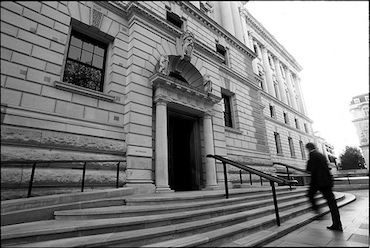Leading firms in the platform and pension sectors are urging Ministers to scrap changes to the money purchase annual allowance.
An HM Treasury consultation is underway, proposing that the MPAA reduce from £10,000 to £4,000 on 6 April 2017.
Sipp provider Suffolk Life and investment firm AJ Bell both raised concerns that the changes to the MPAA are “going against the spirit of pension freedoms”.
Wrap platform Nucleus called for the government to think again. Old Mutual Wealth claimed the move appeared to be based on limited evidence.
OMW said an FOI request it submitted showed that the Government was not able to identify the number of individuals both accessing and saving into their pension.
This was despite HM Treasury’s consultation document estimating that only 3% of over 55s were likely to pay more than £4,000 next tax year.
Old Mutual Wealth expects the proposed change would capture people unintentionally, as many good workplace pension schemes have total contributions of 10% or more of earnings.
Jon Greer, pensions expert at Old Mutual Wealth said: “Our FOI request reveals the Government’s assessment of the impact of the MPAA is a best guess estimate.
“The reduction should be dropped or at least put on hold until the government has firm evidence of its impact and implications.”
Rachel Vahey, product technical manager at Nucleus, said the change “sits at odds with the key government policy of encouraging people to work for longer”.
She said: “It shows on pension freedoms the Government is talking the talk, but not walking the walk.”
She said: “The aim of the change is to prevent people recycling tax relief. However, no evidence has been presented showing an increase in the level of recycling. Reducing the MPAA will stop some people who have taken retirement income from paying substantial amounts back into a pension to ‘double dip’ on tax relief. But it’s a very blunt tool, and runs the risk of affecting many more people’s retirement plans through ‘collateral damage’.”
Suffolk Life said its research among advisers showed the
Government was wrong and that MPAA is not being used to recycle pension contributions.
Some 71% of advisers surveyed said the proposed reduction would affect particular groups of investors, primarily those that are self-employed and owners of small businesses, those approaching retirement and those with unexpected circumstances, including redundancy and ill health.
Greg Kingston, Suffolk Life’s head of product & insight, said: “Advisers and their clients are losing confidence in their ability to effectively plan for retirement. From our survey responses, it appears that the people who would be most greatly affected by this change are individuals who have been most sensible with their saving plans. These are individuals who may be affected by sudden unfortunate events – but still see the importance in making retirement provisions for later life, rather than simply relying on the state pension.”
AJ Bell wrote to Richard Harrington, the Pensions Minister urging the Government to delay the MPAA change. Its key recommendations to the consultation were:
• Scrap pensions carry forward in relation to money purchase contributions for anyone who has accessed their pension
• Use the tax savings from this to set a ‘universal MPAA’ at a level that is sustainable and fair
• Trigger the ‘universal MPAA’ when a pension is accessed in any way (including tax-free cash and annuity purchase)
Tom Selby, senior analyst at AJ Bell, said: “The proposed cut to the MPAA is expected to raise tens of millions of pounds. This is loose change in Government spending terms but the cut flies in the face of the pensions freedoms.
“Furthermore, the rules create an anomaly whereby someone who takes 25% of their pension fund tax-free can use carry forward to pay in up to £160,000, while someone who takes £1 of taxable income can only pay in £4,000.
“It is not just the super-rich who will be affected – large chunks of middle Britain, many of whom might need to catch up for years when they have failed to save, will also be caught.”

